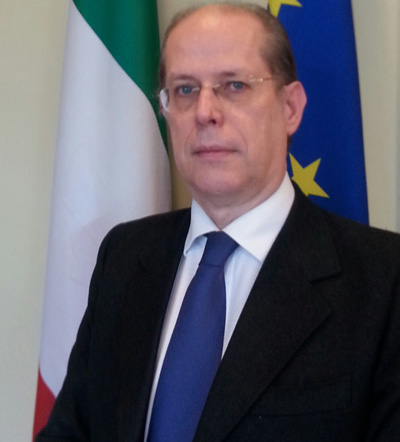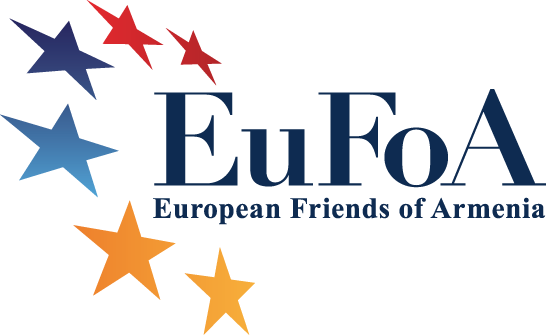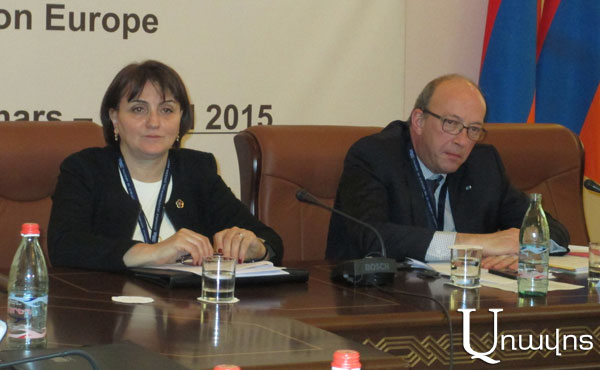The notion of Europe as a political entity built around specific values has taken much time to gather shape, although in the distant past there has occasionally been some awareness of the role of values in identifying civilizations besides race, loyalty to a ruler, religious tradition, or control over a defined portion of land. The ancient Greeks, for example, considered their dimension as being qualified also by political freedom, unlike the tyranny with which they associated the world beyond.
However, despite there being commonalities among European peoples, it took centuries for values to become the cornerstone around which a European identity could burgeon.
The Enlightenment boosted the development of new ideas which were strongly connected to the notion of human values. Such ideas spread, tending to universality.
In Europe, the XIX century eventually witnessed the triumph of revolutions that established nation states as linguistic and cultural units. These new entities saw the light by invoking basic values, amongst which liberty stood out. As far back as 1834, Giuseppe Mazzini, one of the fathers of the Italian State, advocated a loosely federal Europe, in the belief that the Italian movement should have its logical continuation in a European-wide revolutionary movement for liberty. The revolutionary association that he founded to this end, named “Young Europe,” brought together political refugees from Italy, Poland, and Germany.
Read also
It might also be recalled that the XIXth century saw great developments in international law. Furthermore, the creation of the Inter-Parliamentary Union at the end of that same century became a first structured attempt to encourage governments to solve international disputes by peaceful means.
The great turmoils of the twentieth century, and the moral soul-searching that they provoked, truly brought values to the forefront as a foothold for a better world, one not only based on peace and cooperation between nations, but also one where such cooperation might develop on a supranational level.
In parallel to the growing quest for universal rule of peace and justice -or, perhaps, as a consequence of it- the idea of a united Europe started to be spelled out more explicitly. In 1921, for example, French Prime Minister Aristide Briand put forward the idea of a Federal Union. Not long after, Winston Churchill wrote an article where he floated the idea of United States of Europe as a remedy to dangerous instability in the European continent.
The Second World war made the case for values even more pressing, and on a more global scale. In 1948 the vast majority of states signed the Universal Declaration of Human Rights. In Europe, the Council of Europe sought to achieve a greater unity between its members for the purpose of safeguarding and realising the ideals and principles which are their common heritage and facilitating their economic and social progress. It was open to any European State accepting the principles of the rule of law and of the enjoyment of human rights and fundamental freedoms.
It was also in the wake of such crucial developments that the Schuman Declaration set the European project in motion : the creation, in 1950, of the European Coal and Steel Community gave life to an institution which, beyond its merely economic aims, echoed the spirit of the time in seeking to root peace, development, and democracy in Europe through supranational means. Indeed, it became the first example of a democratic and supranational Community.
From that moment on, the adherence to such values as democracy and the respect of human rights would become quintessential for joining the European communities.
The Treaty of Lisbon highlights the role of values in its preamble. It is interesting to note that the text makes reference to “…the cultural, religious and humanist inheritance of Europe, from which have developed the universal values of the inviolable and inalienable rights of the human person, freedom, democracy, equality and the rule of law”. In other words, Europe’s cultural, religious and humanist inheritance is not presented as differentiating Europe from the rest of the world, but, on the contrary, it is explicitly linked to the development of universal values.
The pivotal nature of values was also reiterated in the Joint Communiqué of the Ministers of Foreign Affairs of the founding members, when they met in Rome on 9 February 2016 and declared that “for many generations, Europe was merely a dream of peace and understanding, accompanied by the hope for human dignity, freedom, democracy, the rule of law and solidarity on the continent. The European project has enabled us to make these very principles the foundation of our coexistence in Europe. They have been the basis for our security, stability and prosperity. They are also our capital for our common future.”
Thus, European values are really the universal values of humankind. But are there any such values that are being prioritized within the E.U.? And how much are they shared, de facto, by the peoples of Europe?
A research conducted in 2012 by Eurobarometer tried to identify the “Values of Europeans”, seeking to ascertain whether or not they are shared values, as well as which are the values attributed to the European Union. Asked which ones matter the most to them, Europeans first mention human rights and respect for human life, followed by peace, democracy, equality, solidarity, tolerance , self-fulfilment, respect for other cultures, religion.
A relative majority of Europeans (49 per cent) continue to think that, in terms of shared values, EU Member States are close to each other. Interestingly, young Europeans are more likely to see the Member States as close in terms of values. Furthermore, an absolute majority of Europeans believe that, in comparison with other continents, it is much easier to see what Europeans have in common in terms of values.
Hence, we can safely repeat that the European Union is not a reality that seeks to define itself through its differences from the rest of the world as much as through its earnest earnest commitment to values that are shared by the vast majority of human society, recognizing in them the only viable conditions for peace, stability, and progress.
This awareness also facilitates interaction with both the Union’s partners and other interlocutors who share such beliefs, promoting dialogue and cooperation. This is also the case of the Republic of Armenia.
Upon addressing the 2015 Riga Summit, President Serzh Sargsyan, while expressing high appreciation for the Union’s application of differentiated, tailor-made approaches to each individual country, underscored the strong belief that all partners shall adhere to shared values and ensure peace and stability of the region, adding that “the Republic of Armenia will continue working exactly in this direction.”
Giovanni Ricciulli
Ambassador of Italy to the Republic of Armenia




















































